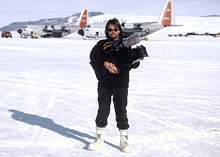| JM - David, we’ve seen some pretty impressive footage in films you’ve shot in all sorts of remote places, but you blagged your way into your first ever film job – as director I hear! It must have taken some nerve. How did you manage it?
DB - I was working for a national charity that needed a publicity video. I’d never been near a video camera but figured that if I could raise the money to hire in some equipment, it would be fun to do it myself, learning as I went. I asked British Gas for some money because they had sponsored this charity before. In my pitch I claimed I had considerable experience as a video director, so they could hand over the dosh with complete confidence. Unfortunately, the deception backfired. Instead of the money they gave me their in-house film crew for a couple of weeks! So it was down to the library and a quick read of the official BBC "how to be a film director" book the night before presenting myself to a very experienced -and I daresay slightly suspicious- crew. I kept it up for a couple of days and then had a stroke of luck. The cameraman forgot his camera on a chopper flight to a location in Wales. British Gas were so embarrassed that they decided to let me have the cash after all – and off I went. JM - Was the film any good?
DB - I watched it again a few months ago and although it has some rough edges I must say it’s really not bad! It was basically a 20 minute doc on the problems of fuel poverty. It was used to persuade dozens of local communities to set up home insulation projects, so it must have had the desired impact on its audiences. JM - It’s a big jump from commandeering a corporate crew to finding your way through some of the world’s hottest trouble spots with camera kit, but it was your next step, or should I say leap! What drove you to make it?  DB - I realised I loved being behind the camera. I also needed a change of job, so I decided I’d become a cameraman. I figured the only way to break into TV was to have footage no one else had, which basically meant going where no one else wanted to go. I teamed up with journalist Jacqui Marson and armed with a camera hired on an overdraft, we headed for the world’s less comfortable places, shot some good exclusive stories and snuck in TV’s back door -the one labelled "Unqualified & Untrained". JM - Nicaragua, Sudan, Kashmir, they are all places that were fraught with danger. Did you never feel afraid or even get to think "wrong place, wrong time, I really would rather be somewhere else"?
DB - We had some uncomfortable moments. But we were always driven by the story, not the adrenaline rush, so we tended to retain our sense of self-preservation. Because we were making longer reports and docs we had plenty of time to get to know the soldiers we were living with. That trust and that camaraderie goes a long way to easing the fear. JM - Wildcat Films seems like an appropriate handle for what you were up to at that time. Would you like to revisit these trouble spots in quieter times? Where particularly would you like to go and why?
DB - It’s hard going back. I’m not an adrenaline junkie but the intensity and friendships that come from working in a war zone is something quite special and it’s often an anticlimax revisiting the same place in peacetime. I do want to return to Sarajevo however – but simply to visit a Bosnian family I came to know while they were refugees in Cumbria during the war.  JM - From reportage you moved to documentary. Environmental issues have been one of your specialities. Is that a serious interest, or a passionate interest?
DB - Both. I’d previously worked for environmental campaigns and used to think myself lucky when I could get a few lines of a press release in the local paper. Then suddenly I found I had access to 12 minutes of Channel Four News, plus another 3 minutes on News at Ten so we tended to use the opportunity to publicise the issues we felt passionate about. JM - If someone was to say right now, "Right Davie, here’s a budget, go and do me something environmental, where would you go and for what?
DB - I love the Arctic and Antarctica so it wouldn’t be hard to persuade me back to either Pole. But that would be an indulgence. The programme I really want to see on UK TV is a hard hitting investigation into how many of the so called "guardians of the countryside" like country landowners and their gamekeepers are illegally -and largely with impunity- destroying the natural diversity of our wildlife. The keepers on a nearby estate have just illegally wiped out a badger colony which I’ve been watching for years – that’s the sort of story we need to see on TV, not Clarissa Dickson-Wright prattling on about how field sports are essential to wildlife conservation. |